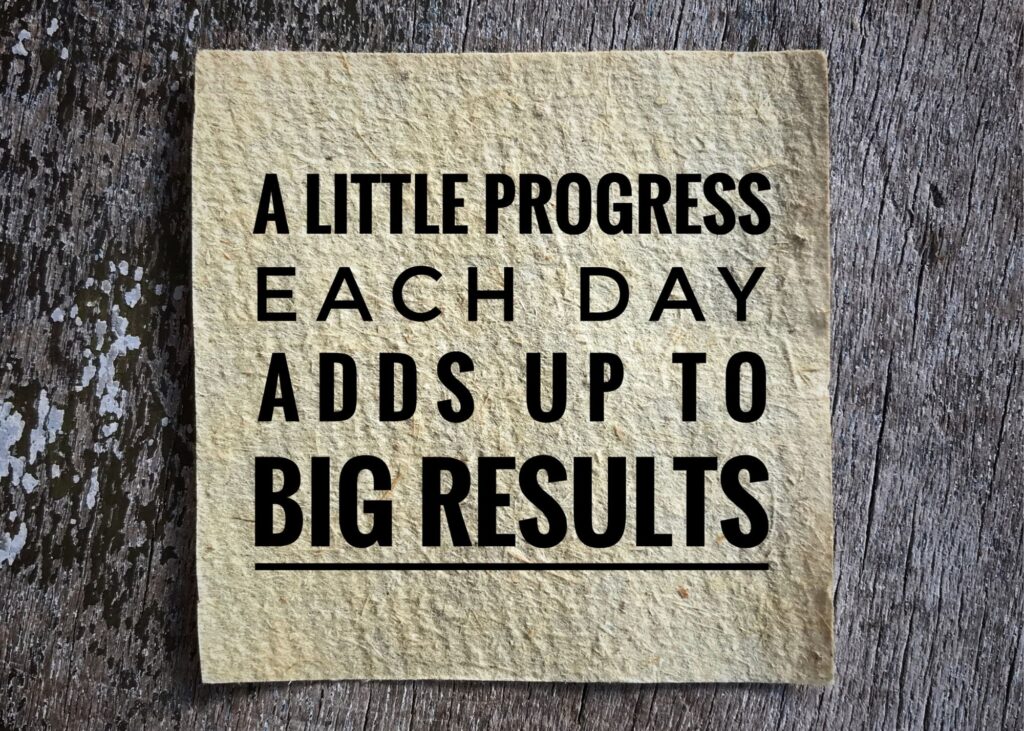Is it time to get out of your own way? The obstacle to living the life you want, achieving your dreams, and reaching your goals is you. Here’s the solemn truth [and I say it with love]: You are the only one standing in your way. While we can do this knowingly or unknowingly for any number of reasons, your capacity is not one of those reasons.
You have the capacity to do whatever you put your mind to do. You might already know this. Yet, you may still find yourself unable to move forward with what’s nudging at your heart and soul. Regardless of what you think it is that is holding you back, here are five simple steps you can take today to get out of your own way.
1. Confront Negative Self-Talk: A Must To Get Out of Your Own Way
At one point or another you will be plagued by negative self-talk. It happens to the best of us. As soon as you so much as utter in thought or aloud a negative critique of yourself, stop. I’m talking slam the brakes stop. In that moment of clarity, say to yourself, “Nope. I see where this is going. I know where this road ends, and I will not go down that road.”
Instead, acknowledge the emotion you are feeling, why you’re feeling it, and decide what you will do about it to move forward. So, instead, you could say something like, “I am feeling overwhelmed because I have so many choices. I will narrow my choices down to one viable option that works for me right now.”
The reality is that you will continue to experience negative thoughts now and again. However, you can learn to recognize and interrupt this vicious cycle before it harms your well-being, stifles your creativity, and fosters your inaction. All it takes is your willingness to snap out of it. Argue with yourself if need be. Tell your internal bully that you are in control and there will be no negative self-talk today.
What’s Your Go-To Brand Of Negative Self-Talk?
In order to consistently take charge of your negative self-talk, it’s helpful to familiarize yourself with the brand of self-talk you tend to engage in. By doing so, you can learn how to defeat it. According to the Harvard Stress and Development Lab, there are 10 types of common negative thoughts. Learn more here.
Maybe you indulge in all-or-nothing thinking, fortune telling, magnification, or personalization, to name a few. Whatever your brand of negative self-talk, your thoughts and feelings are just that and don’t need to dictate your mood or behavior. If you want to get out of your own way, it’s crucial to mitigate negative self-talk.
2. Know Your Strengths
While strengths are not static and can be developed over time, think about what your current strengths are and write them down. Frankly, your strengths can be anything. Consider relationships, resources, skills, abilities, expertise, character or personality traits, and so forth. Not sure what your strengths are?
How You Can Identify Your Strengths:
- If you work in a job where you’ve received an evaluation, refer to positive feedback you’ve received and identify patterns in your evaluations.
- Ask friends and family that you trust for feedback about what they believe your strengths to be.
- Reflect on compliments you’ve received in the past and identify any themes or patterns in the comments you’ve received.
- Think about what you find energizing, motivating, and enjoy. For example, do you like to make people laugh and find that folks consistently laugh uncontrollably at your jokes or tell you that you’re funny? If so, that’s one of your strengths.
If you could benefit from additional resources to help with identifying your strengths, this article by Matt Migona is brief and provides further guidance to identify your strengths in general. However, if you want to go deeper, and especially if you are looking for a more robust guide that is more career oriented, check out this article.
When you find yourself at a crossroads or indecisive, play to your strengths. If what you are trying to pursue is beyond your strengths, consider tapping someone with demonstrated expertise relevant to the decision you want to make or action you’d like to take. This takes the pressure off of you.
3. Know Your Weaknesses To Quickly Get Out of Your Own Way
Similar to knowing your strengths, you should also know your weaknesses. It’s important to note that just because something is a weakness for you now doesn’t mean that it will always be the case. You can always improve in every area of your life. However, when you find yourself getting stuck because a decision or action requires expertise beyond your current understanding or capacity, that is sign to call in a professional.
Identifying your strengths can be challenging due to our tendency as human beings to focus on our negatives. We tend to be much more aware of our weaknesses. As a result, you might find it easier to acknowledge your current limitations so that you save yourself time and aggravation. The more quickly you can recognize that you are unqualified to take action independently or that you are not well positioned to tackle the issue at hand, the sooner you can find the person or resource you need to help move you forward.
Your Best Options To Mitigate Your Weaknesses:
- Tap your network by talking to family members or friends that you trust for their knowledge, expertise or a referral.
- Do an internet search to find out what you should be thinking about concerning a decision when you are unsure. For example, what if you recently inherited money, but don’t know what to do with the money. You can search, What do I do if I inherit a lot of money? While you’ll receive lots of different advice, you’ll also notice a recurring theme to get a financial advisor. Sure you still need to make a decision about which financial advisor to hire, but at least you’ve narrowed down all your options to a starting point. That initial decision to hire a financial advisor will provide you with the guidance and support to make all of the other decisions.
4. Find Your Camp
It matters whom you spend your time with. The company you keep can either help or hinder your success. Furthermore, based on the law of averages, you are the average of the five people you spend the most time with. So it’s important to know whom to keep around and whom to prune from your life when you’re trying to accomplish your goals.
Whom To Keep In Your Life:
- Find professional allies such as a sponsor, advocate, mentor, confidant and so forth. Allies use their credibility to create more inclusive environments and find ways to make their privilege work for others. In other words, they are there to help you get out of your own way.
- Surround yourself with positive individuals that support you and your success. Attitudes and habits are contagious. It behooves you to seek out individuals who have the kind of life and career you want.
- Cultivate friendships that are encouraging and supportive when times get tough.
Whom To Prune From Your Life:
- Limit your exposure to toxic and negative relationships in any form. According to Dr. David McClelland, a Harvard social psychologist, the people you consistently associate with will determine 95% of your success or failure in life. In other words, you become who you spend your time with.
- Avoid spending time with anyone who detracts from your life and exhibits traits or behavior that is manipulative, judgmental, jealous, and so forth.

5. Commit To Progress Over Perfection
Progress is ultimately how you bridge the gap between your ability and your ambition. While striving for excellence is laudable and high standards are healthy and even motivating, perfectionism is an insidious trap. The truth is that perfection does not exist and your quest for it will lead you down a road of indecisiveness and dysfunction. In the worst case scenario it leaves you dead in the water.
It can be tempting to want to wait for something to reach a certain level of finished before you move forward. Similarly, the fear of making the wrong decision or desire to make the right decision can also paralyze you. When you focus on progress over perfection, you can systematically learn to get of your own way.
Tactics To Aim for Progress Over Perfection and Get Out of Your Own Way:
Get out of your head
As soon as you want to make moves, and especially if it requires a decision, all of the self-defeating questions and thoughts start to inundate your mind. You become berated by your what-ifs, how-tos, and all of the reasons not to move forward. Similar to negative self-talk, it’s important to shut it down as soon as you realize you’re engaging in this self-destructive behavior. You don’t have to have everything figured out.
Take baby steps
Choose to focus on the here and now and take one small step today. The smaller the better. If you focus on completing one small step, you’ll make progress. It might even be helpful to focus on quantifying this step. As an example, you might dedicate a certain amount of time toward completing a specific step. To continue with our example above, you might say, I will spend two minutes researching what to look for in a good financial advisor? You’ll find that you’ll likely spend more than two minutes and will make more progress than you set out to accomplish. For more tips about how to make progress with your goals, check out this other article I wrote.
Cross that path when you get to it
Even when you successfully manage to take baby steps toward your goal, it can be difficult to tune out all of the other things that are legitimate potential challenges. When this happens, write them down and any potential instructive details associated with overcoming that challenge. Once you write them down, you no longer need to continue to think about or worry about them. You can rest assured knowing that you’ve accounted for them, invested some thought into potential scenarios, and documented your thoughts about it for future reference. Now you can leave it on the page instead of draining your bandwidth, heightening your anxiety, killing your creativity, and stifling your progress.
Get a Plan of Action
Now that you’re thinking about your baby steps, anticipating potential challenges, and documenting potential solutions, you’ve got yourself a plan. Let go of how long it will take to reach your goal. Remember that any progress you make will get you closer to your goal as opposed to inaction. Practice patience and stick to your plan until it no longer serves you or your goals.
Pull the Trigger
Once you’ve got a plan and have started taking baby steps, you’ve essentially pulled the trigger. You will gain momentum as you continue to make progress toward your goals and mitigate the challenges you foresaw. Continue to revisit and adjust your plan as necessary. You’ll find that your next steps will reveal themselves to you and you no longer have to engage in overthinking. Now you can just focus on taking small steps in the direction of your goals.
In Summary
When it comes down to achieving the life you want and realizing your dreams and goals, it is up to you to get out of your own way and make things happen. It’s crucial to cut out negative self-talk, embrace your strengths, mitigate your weaknesses, surround yourself with the right people, and commit to progress over perfection. By getting out of your head, planning ahead, and taking small steps daily, you can start making the progress toward your goals that you’ve been craving.
CHECK-IN
1. Which brands of negative self-talk do you tend to engage in?
2. How has pruning your relationships benefitted you?
3. Which tactic do find the most useful for making progress over perfection?



























2 thoughts on “Five Steps To Get Out Of Your Own Way”
The 2 negative self-talk i mostly engage in are mental filter, where I dwell on it for a looooooong time, and mind reading, where I always think people are mad/upset at me or don’t like me. But I am working on it! Also, pruning mt relationships has really ehlped. COVID times have heled with that as well. Covid helped prune away!
I have two primary types of negative self-talk I engage in also. I’ve gotten MUCH better about it, but I tend to engage in all-or-nothing and personalization. It’s really powerful to be able to acknowledge and tackle head on the self-defeating behaviors we engage in. What does you in is when you don’t realize you’re doing it. When you know better, you can do better!
Comments are closed.